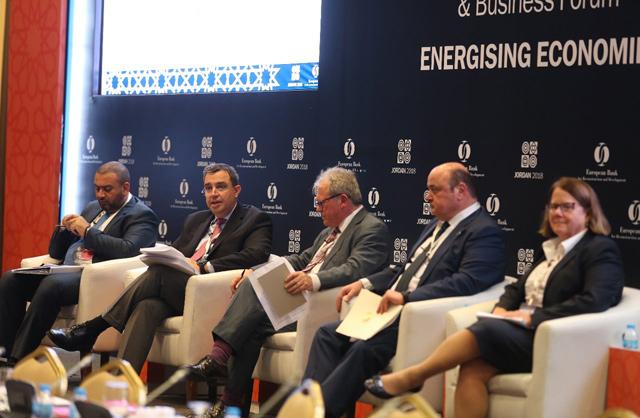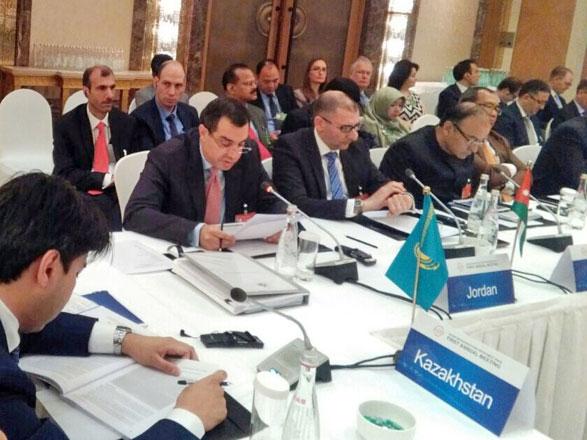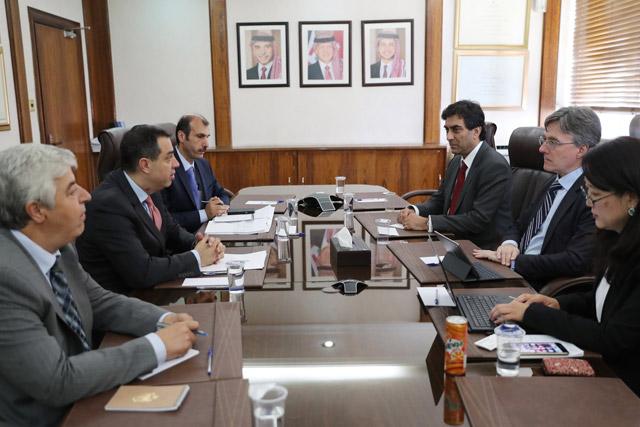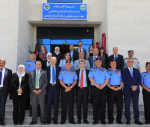You are here
Fakhoury urges more global collaboration to meet need for investments in infrastructure
By Mohammad Ghazal - May 08,2018 - Last updated at May 08,2018

Minister of Planning and International Cooperation Imad Fakhoury takes part in the preparatory session of EBRD’s annual meeting, which will kick off today (Petra photo)
DEAD SEA — Investment in infrastructure is essential to support economic activities, generate jobs and achieve economic growth and competitiveness, which is in line with the 2030 Agenda of Sustainable Development Goals (SDGs), Minister of Planning and International Cooperation Imad Fakhoury said Tuesday.
The World Economic Forum estimates a global need for $3.7 trillion in infrastructure investment each year. Approximately, 60 per cent of that sum will come from the emerging market and developing economies. However, only $2.7 trillion is currently being invested in infrastructure, leaving a gap of around $1 trillion, said the minister.
“Meeting the increased demand for infrastructure poses a significant financing challenge for governments, given the constraints on existing sources of finance and the available resources and also taking into consideration other pressing needs,” said the minister during a session titled “Mobilising Infrastructure Investment in a Fractured Context”.
The session was part of the preparatory meetings for the European Bank for Reconstruction and Development’s (EBRD) 27th annual meeting and business forum that will start from 9-10 of May.
During the session, attended by EBRD’s chief, Suma Chakrabarti, panellists stressed that substantial progress has been made in structuring and implementing infrastructure projects in the southern and eastern Mediterranean region, contributing to significant social, environmental and economic development.
They looked into challenges facing implementation of infrastructure projects including the lack of necessary financing, calling for innovative approaches to increase private financing and government initiatives such as dedicated private-public partnership (PPP) units, project prioritisation and acceleration programmes, which, they said, can help to address some of the risks and increase access to capital for priority infrastructure projects.
Fakhoury said countries in the southern and eastern Mediterranean are either still in transition or moving towards stabilisation and reconstruction. There are countries that are still undergoing conflicts and others with huge burdens due to regional conflicts, while also undergoing major reforms with limited fiscal space.
“In addition to this, influx of refugees has created unprecedented pressure on infrastructure and other public goods and services. Governments in the region thus find themselves in a situation where their fiscal space is very limited,” he said.
The minister called for stronger collaboration among private sector financiers, governments and others, especially with regards to large-scale complex projects that no single financing institution can meet.
Highlighting the Kingdom’s experience with PPPs and private financing, Fakhoury said: “We have been successful in positioning Jordan as a regional model for successful PPPs where it is estimated that over $10 billion worth of projects were implemented as PPPs in Jordan in a wide array of economic sectors, ranging from power generation, renewable energy, wastewater and transport.”
He said that the EBRD has been a key partner for Jordan in leveraging private financing and using PPPs as a policy instrument, adding that since 2012, EBRD has committed over 1 billion euros for a significant number of investment projects in addition to $85 million worth of equity, trade facilitation and finance credit lines investments with local banks.
In the last three years alone, EBRD has mobilised around 163 million euros in grants and concessional financing for the bank’s business in the infrastructure sector in Jordan, said the minister.
Jordan has identified a number of priority infrastructure projects of about $15 billion to be delivered through PPPs in the sectors of energy, renewable energy, transport, water, solid waste, urban development, green economy and more over the next 5 years, according to Fakhoury.
“The government is also pursuing measures to further strengthen public financial management and implement a Public Investment Management Framework to enhance the efficiency of capital spending, prioritise investments and maximise the use of private financing and PPPs to implement capital expenditure,” he said.
In a session on China’s “Belt and Road Initiative – What it Means for the Economies where the EBRD Invests”, participants stressed the importance the initiative for enhancing global trade and development.
The plan, they said, will play a key role in achieving desired development, create jobs and improve income of communities where the initiative will be implemented.
Speaking during the session, Yulu Chen, deputy governor of the People’s Bank of China, said that the mega global project would play a major role in enhancing financial connectivity and people to people communication in addition to boosting trade.
A multibillion land and maritime project, the One Belt One Road project aims to connect China to the rest of the world, including Jordan.
The Silk Road Economic Belt focuses on bringing together China, Central Asia, Russia and Europe, while linking China with the Arabian Gulf and the Mediterranean through Central Asia and the Indian Ocean.
Related Articles
AMMAN — Minister of Planning and International Cooperation Imad Fakhoury participated in the first annual meeting of the board of governors
AMMAN — Planning and International Cooperation Minister Imad Fakhoury on Friday commended the outcomes of the European Bank for Reconstructi
AMMAN — Minister of Planning and International Cooperation Imad Fakhoury on Wednesday met with a delegation from Asian Infrastruc















